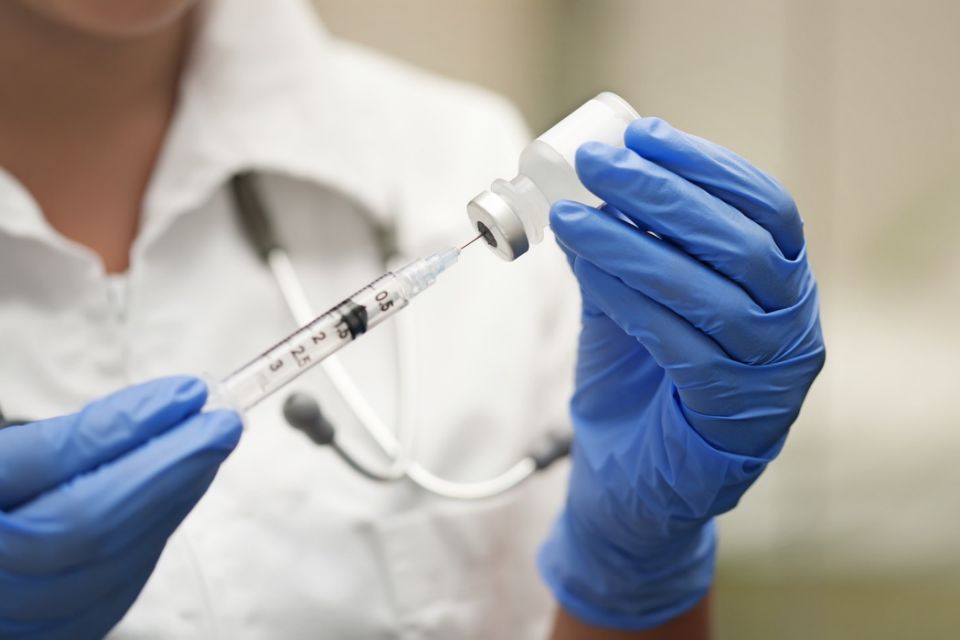When you want to build muscle, you go to a personal trainer. When you want to build your heart muscle, well, who better to treat, protect and feed the organ pumping literal lifeblood through your veins than a cardiologist?
Eat This, Not That! Health went straight to the country’s best to ask how they keep their tickers in tip-top shape. Given that heart disease is the leading killer of both men and women in the United States—and it makes up about one in every four deaths—we’re glad we did. Read on, and to ensure your health and the health of others, don’t miss these Sure Signs You’ve Already Had Coronavirus.
1
Get a Flu Shot
Flu? And heart health? What’s the connection? This: Adults over 65 are more likely to experience fatal flu complications, including heart attacks. That’s why cardiologists like Allen J. Taylor, MD, Chair of Cardiology at the MedStar Heart and Vascular Institute, get flu shots every year. “Many individuals are unaware that their risk of a heart attack increases by up to 10 times in the days and weeks after an acute flu infection,” he says.
2
Get a Physical Every Year
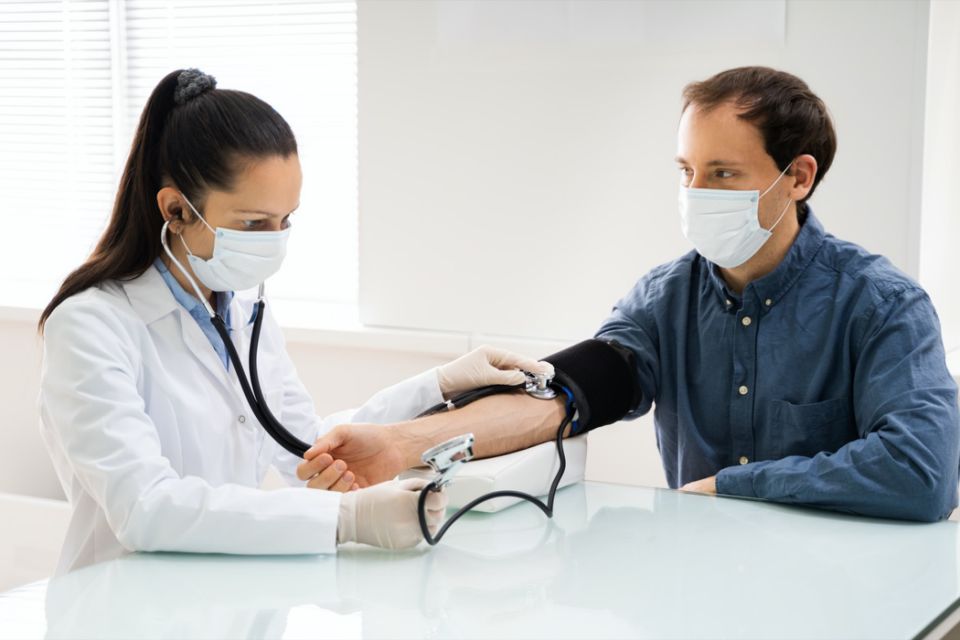
Raise your hand if you only go to the doctor when something’s wrong.
While that’s not uncommon, it’s better to prevent a problem (when possible) then to an illness. That’s why cardiologists like Tarak Rambhatla, MD, opt for yearly physicals to suss out potential issues.
“Even if we feel healthy now, the point of this is to avoid a heart attack in the next 10 to 20 years. If we have underlying cardiac risk factors that we don’t realize, those can progress to real disease in 10-15 years,” he says. “If you at least know those numbers, it will give you a good framework for identifying risk factors [for heart attacks and disease].”
3
You Know, Do It

OK, we didn’t ask cardiologists about their sex lives—you get enough of that on Grey’s Anatomy. But we know that they know that sex provides heart healthy benefits. “The protective benefits may be many: Sex is a form of exercise and helps strengthen your heart, lower your blood pressure, reduce stress and improve sleep. In addition, intimacy in a relationship can increase bonding,” reports Johns Hopkins. And “strong social connections,” says Dr. Michael Blaha, M.D., M.P.H., director of clinical research at the Johns Hopkins Ciccarone Center for the Prevention of Heart Disease, “can lower feelings of loneliness, depression and anxiety, which have been linked to higher heart disease risk.”
4
Get Your Steps In

The American Heart Association recommends getting in 75 minutes of moderately intense exercise every week to keep your ticker going strong—a number that can seem impossible with the demands of work and family life.
The solution? Work your workout into your everyday life, like Roger Blumenthal, MD, a cardiologist at Johns Hopkins Medicine.
“I wear a pedometer each day to monitor the number of steps I walk a day,” says the American Heart Association volunteer expert. “I try to make 7,500 steps—about three miles—my minimum each and every day. If one does not have a pedometer they can often track the number of steps and distance walked on a smartphone (like the iPhone) or on a FitBit or Apple Watch.”
5
Keep the Sodium to a Minimum

Here’s a scary stat: People who regularly eat fast food consume 50 percent more than the recommended daily intake for sodium, according to a study published in the AHA journal Circulation.
While the American Heart Association recommends 2,300 mg of sodium a day maximum, the average adult consumes more than 3,400 mg. This can spell trouble for your health because sodium is one of the leading contributors to high blood pressure, one of the risk factors for heart disease and heart attacks.
Avoid those risks by limiting added salt as much as possible.
“For packaged foods, the nutrition fact panel may be useful in identifying lower sodium products, and for menu items, diners can request sodium content information,” said the study’s lead researcher, Lisa J. Harnack, Dr.PH., professor at the University of Minnesota in Minneapolis. “Also, if you frequently add salt to food at the table or in home food preparation, consider using less.”
6
Stay Away From Processed Foods

Do you frequently dine on frozen dinners, canned, and packaged baked goods? Barbara Hudson Roberts, MD, a cardiologist and Associate Clinical Professor of Medicine at Brown University, wishes you wouldn’t.
“The number one rule this cardiologist follows for healthy eating is to consume food that’s been monkeyed with by human beings as little as possible,” she says. “Ditch the processed food and embrace your inner chef.” The reason: Two large—and recent—studies showed that so-called “ultraprocessed” foods are linked to an increased risk of heart disease and premature death.
One of the studies, conducted in France, found that there was a 12 percent increase in the risk of cardiovascular disease for every 10 percent increase in ultraprocessed food the study subjects ate—even after accounting for other factors like age, body mass index, smoking and alcohol consumption, and physical activity.
7
Eat Heart-Healthy Fats
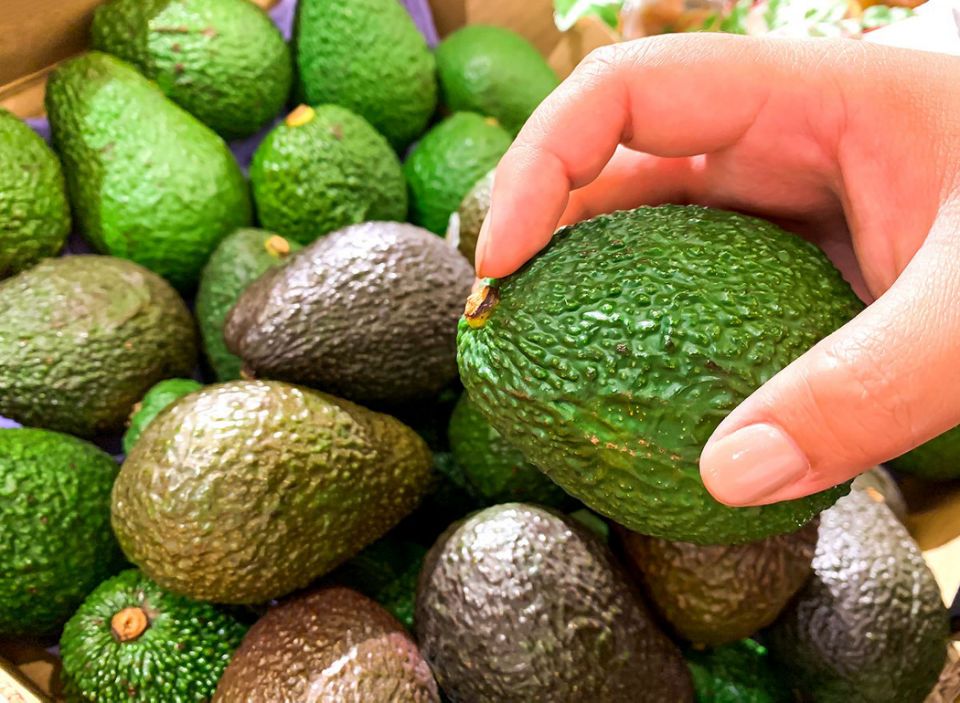
Donna Arnett, American Heart Association volunteer expert, says her biggest tip is to “choose fats wisely.” “Nuts, avocados and fatty fish are good choices,” she says. The reason: They’re all chock full of omega-3 fatty acids, a type of unsaturated fat that helps reduce inflammation in the body known to cause heart disease and other health issues.
8
Limit Red Meat

Red meat has long been connected to heart disease—thanks to the amount of saturated fat found inside—but another study led by Stanley Hazen, MD, PhD, head of the Section for Preventive Cardiology and Rehabilitation at the Cleveland Clinic found that Trimethylamine N-oxide (TMAO), a dietary byproduct formed from digesting red meat, can be a contributor to heart disease.
In the study, the levels of TMAO increased in the group who ate a diet heavy in red meats. The levels decreased once they switched to eat a no-meat or white-meat diet for a month. “This study shows for the first time what a dramatic effect changing your diet has on levels of TMAO, which is increasingly linked to heart disease,” Hazen says.
9
Eat Plenty of Veggies

Vegetables are packed full of antioxidants that keep free radicals away—the free radicals that can cause heart-hurting inflammation. That’s why cardiologists pack their plates full of colorful vegetables. “Make half of your lunch and dinner plate vegetables with a variety of colors,” Arnett recommends.
“Eating foods that are fresh from the ground or from trees without labels and additives is the best way to eat,” adds Suzanne Steinbaum, cardiologist, American Heart Association volunteer expert and director of Women’s Heart Health at the Heart and Vascular Institute, Lenox Hill Hospital in New York City.
10
Avoid Foods That Are Labeled ‘Low Fat’

Sometimes it’s impossible to avoid eating processed foods. In those times, Roberts recommends reading food labels first.
“Avoid anything labeled ‘low fat’,” she says. They’ve usually replaced the fat with something worse.
RELATED: Worst Things For Your Health—According to Doctors
11
Avoid Sugar

There’s a reason why cardiologists like Roberts avoid low-fat foods: Food makers have to make up for the taste the fat adds to the food, usually in the form of sugar.
“Sugar is your enemy so phase it out and learn the many names it can be called to fool you,” Roberts adds. There’s data to back up her comments: The results of a 15-year study published in JAMA Internal Medicine in 2014 found that participants who ate 25 percent of their daily calories as sugar were twice as likely to experience fatal heart disease than those who only ate 10 percent.
12
Partake in ‘Meatless Mondays’

Adding a “meatless” day to the weekly meal rotation is one way cardiologists cut down on red meat—and the saturated fat that can come with it. “It’s also fun to start a ‘Meatless Monday’ tradition with your family and see what recipes you can come up with,” says Dharmarajan.
13
Meal Plan

Avoiding sodium-packed meals and processed foods is vital for heart health, but it’s hard to beat their convenience. You can stay heart-healthy with your meals by following Dharmarajan’s lead and preparing meals in advance.
“If my family and I plan for our meals throughout the week, we’re more likely to keep up healthy eating habits rather than go out for food or order in,” he says. “The freezer is definitely my friend: we often prepare and freeze several healthy dinner options that are ready to pull out on the day we want to eat them.”
14
Pump Iron Every Week

While typical cardio exercise—like walking and running—is often prescribed to help keep your heart strong, cardiologists also know that building muscle mass through resistance training is important, too. The heart is a muscle, after all.
“Recent studies show that even a little weight training could reduce your risk of heart attack or stroke,” says Dharmarajan.
15
Unglue Yourself

Cardiologists—like most of us—are glued to their phones. While they have to be available for work reasons, they also know the value in shutting down.
And they’re right: A recent study by the American Psychological Association found that “constant checkers”—or people who are always looking at social media, email, and other apps on their smartphones—are more stressed than those who aren’t. “Take a holiday from your smart devices on the weekend,” recommends Nieca Goldberg, MD, a cardiologist and American Heart Association volunteer expert. “Choose a weekend day to take a break.”
16
Limit Stress Whenever Possible

There’s a reason why cardiologists like Dr. Golgberg recommend limiting stress: It can do a number on your heart if not controlled. The reason: Stress can increase adrenaline, a hormone that kicks in your “fight or flight” response—and increases your heart rate and blood pressure. Keeping those numbers elevated creates an inflammatory response in the body, which in turn can cause heart issues, including heart disease and even heart attacks.
17
Drink Coffee

Worried that your morning cup—or three—of joe will hurt your heart? Don’t be. “Fortunately, coffee is still OK and even somewhat protective for heart disease and diabetes,” says Richard Collins, MD, a cardiologist based in Littleton, Colorado.
A recent study conducted by researchers at Queen Mary University of London found that even drinking as many as 25 cups of coffee a day won’t impact your heart. While most of us don’t drink that much, another study by German researchers found that drinking four cups can help endothelial cells—or cells that line the inside of blood vessels—function better, which in turn can help the heart pump blood more effectively.
18
Start Your Day with Protein
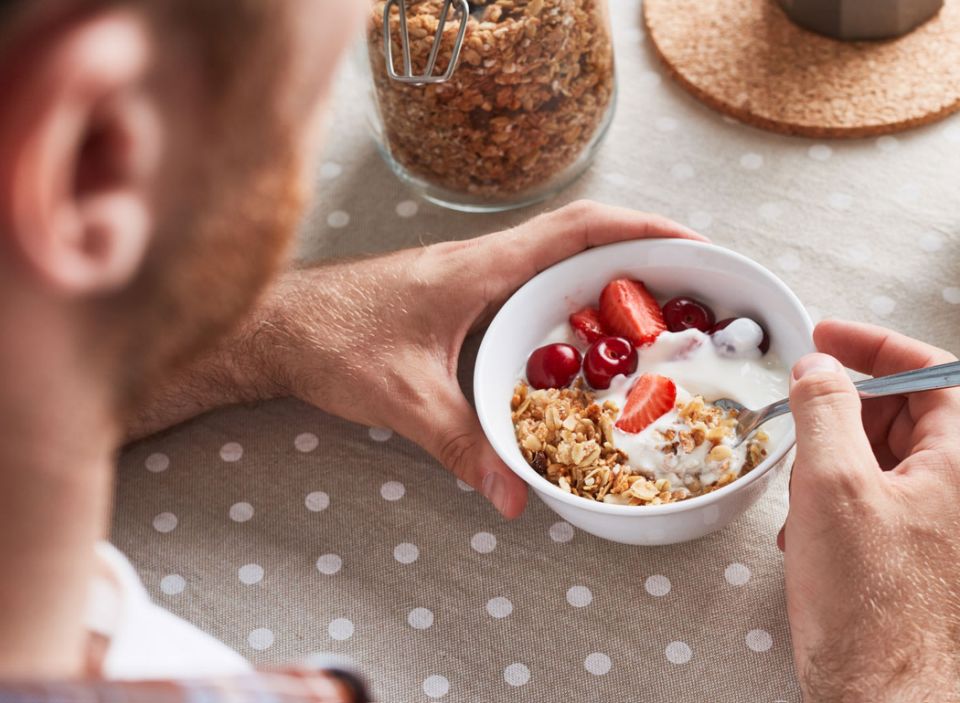
“I have one cup of Greek yogurt with strawberries and blueberries, or bananas and blueberries,” Dr. Evelina Grayver, Director of the Coronary Care Unit at the Sandra Atlas Bass Heart Hospital at North Shore University Hospital, told Northwell Health. “Having protein like Greek yogurt early in the morning keeps you full until lunch to help you avoid reaching for unhealthy snacks. Protein will also allow for a significant amount of stabilization in your blood sugar. Blueberries have been shown to lower your blood pressure and reduce your blood cholesterol levels.” Plus: “They have significant antioxidant levels in them and prevent inflammatory spikes.”
19
End Your Day with Protein, Too
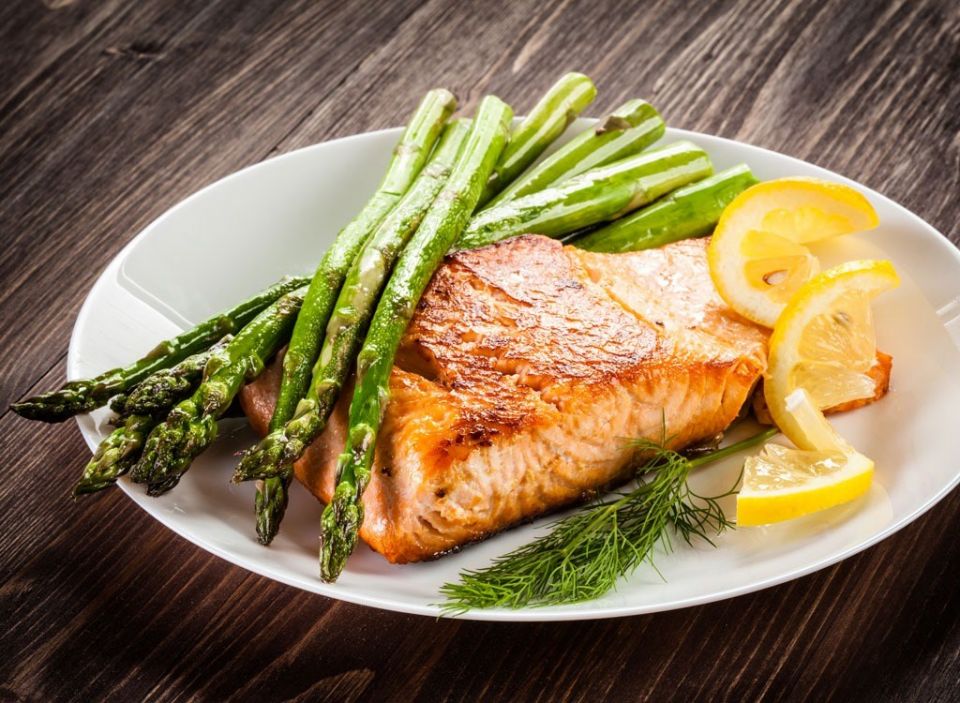
Dr. Rohan Bhansali, Chief of Cardiology at Long Island Jewish Medical Center, enjoys salmon with roast asparagus for dinner. “Asparagus has a lot of fiber, and fiber decreases our body’s insulin response, which helps decrease inflammation,” he told Northwell Health. “The omega 3 in salmon also helps manage inflammation, which is part of what causes heart disease.”
20
Yes, Eat Dessert
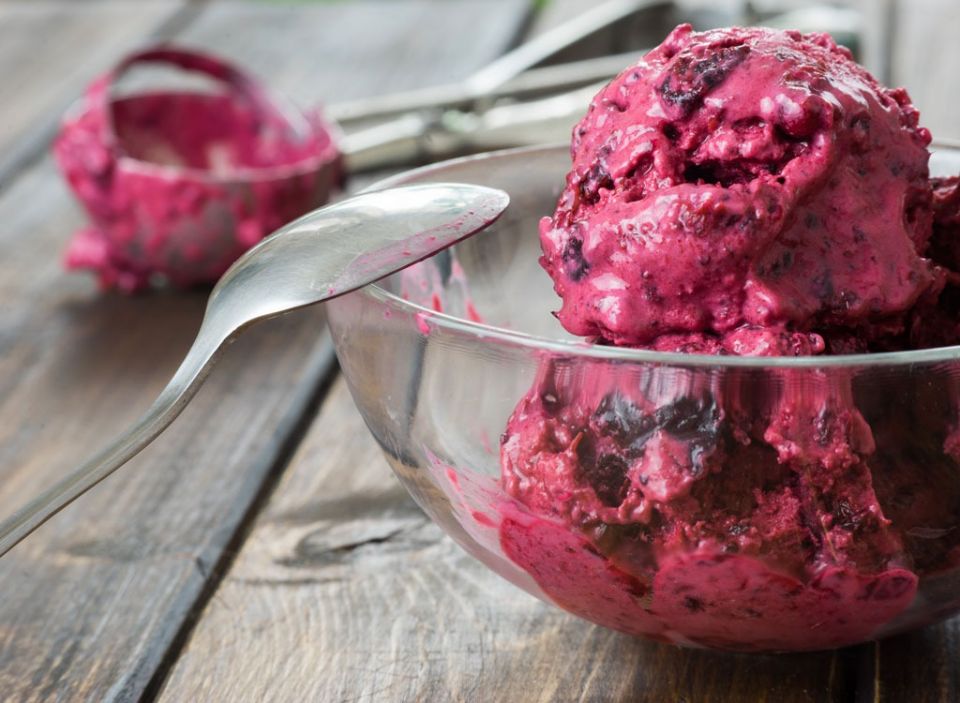
While cardiologists do try to stay away from added sugars, they do still enjoy dessert from time to time—they just make better choices. Sharlene Day, MD, a cardiologist at Michigan Medicine, only eats ice cream once in awhile, she does indulge in frozen yogurt or fruit sorbet a lot more often. “It tastes good, it’s not high in fat and not too high in calories,” she says.
21
Try to Stay Balanced
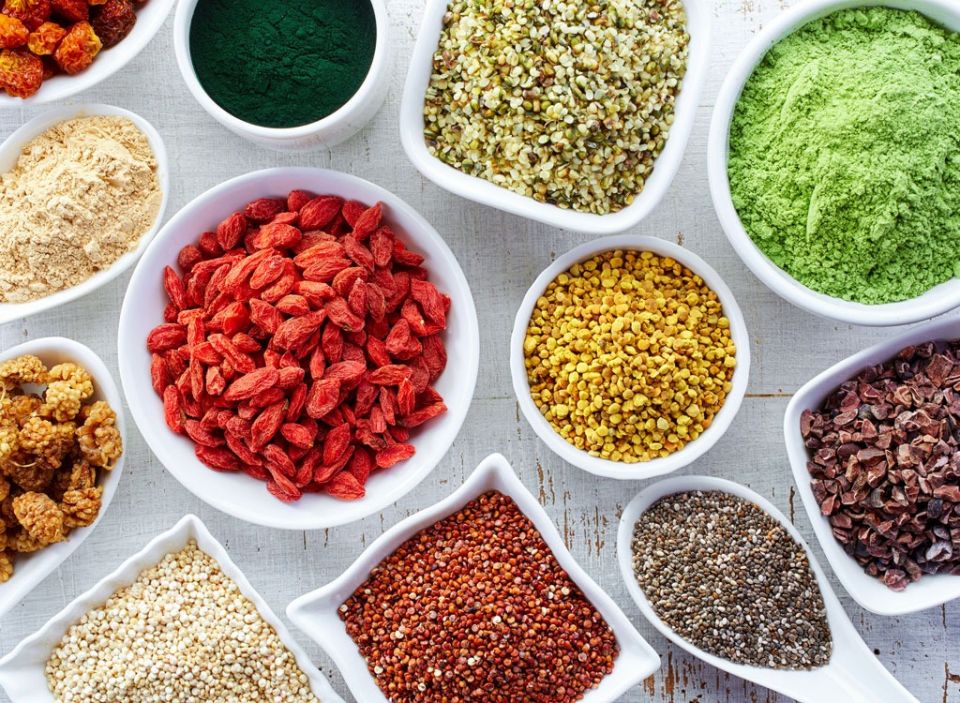
“There isn’t a food that will save your life … And there isn’t one that’s going to kill you. It is about balance,” said Dr. Sharonne Hayes, professor of cardiovascular medicine and founder of the Women’s Heart Clinic at the Mayo Clinic in Rochester, Minnesota, told the Today Show. She’s a vegetarian, and recommends plant-based proteins.
RELATED: I’m a Doctor and This Vitamin May Reduce Your COVID Risk
22
Yes, Eat Eggs

“From what we know today, here’s the bottom line: for most people, an egg a day does not increase your risk of a heart attack, a stroke, or any other type of cardiovascular disease,” Anthony Komaroff, MD, tells Harvard Health “No more than three eggs per week is wise if you have diabetes, are at high risk for heart disease from other causes (such as smoking), or already have heart disease.”
23
Follow the Mediterranean Diet
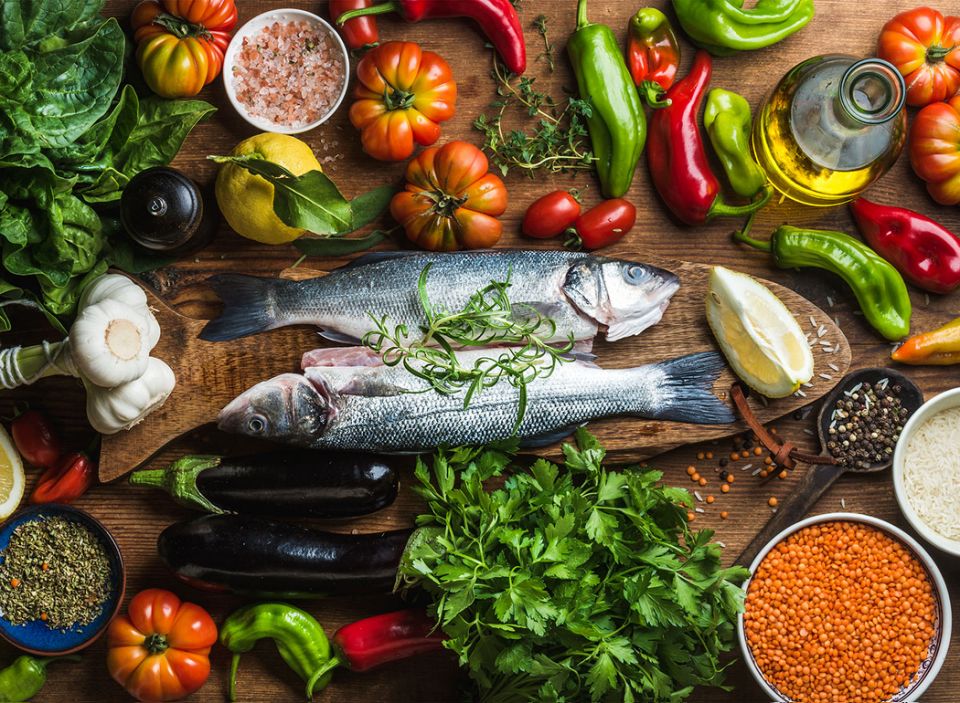
“I am a pescatarian—I eat fish, vegetables, and no meat and for the most part follow the Mediterranean diet,” writes Dr. Gary Gabelman, cardiologist at NewYork-Presbyterian Lawrence Hospital and assistant clinical professor of medicine at Columbia University Vagelos College of Physicians and Surgeons “It has all the basics of healthy eating and whole and natural foods—plus a splash of flavorful olive oil and perhaps a glass of red wine. Research shows that the traditional Mediterranean diet reduces the risk of heart disease, and it’s been associated with lowering the ‘bad’ cholesterol that’s more likely to build up deposits in your arteries. It’s a healthy way to diet and not hard to follow or maintain.”
24
Don’t Smoke
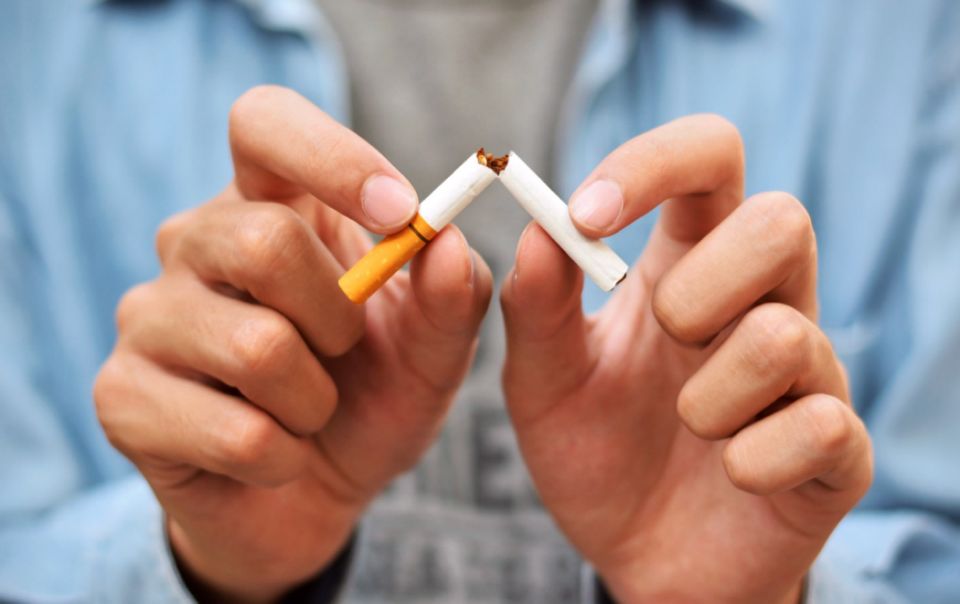
While the number of Americans who smoke goes down every year, the habit is still the leading cause of preventable disease (and death) in the United States, according to the CDC.
That’s why cardiologists like Kumar Dharmarajan, MD, MBA, a cardiologist, geriatrician, and Chief Scientific Officer at Clover Health, don’t ever touch tobacco. “The habit [causes] approximately one of every four heart-related deaths,” says Dharmarajan. But deep breath, exhale: “It’s never too late to quit — smokers who quit see their heart attack risk drop dramatically just one year after quitting smoking,” he adds.
25
Don’t Vape or Use E-Cigarettes, Either

Vaping is often touted as a safer alternative to smoking because it doesn’t include all of the carcinogens that cigarettes have, but recent studies show that vaping can also do a number on your cardiovascular system.
“Until now, little has been known about cardiovascular events relative to e-cigarette use,” says Mohinder Vindhyal, MD, assistant professor at the University of Kansas School of Medicine Wichita and the lead author of the study, adding that the data should be “a real wake-up call” about the dangers of vaping and e-cigarettes.
26
Listen to Your Body

Our bodies are pretty good at telling us when something is wrong—most of the time. Cardiologists like Dr. Dharmarajan pay attention to what their bodies are telling them. “Chest pain is the most common symptom of a heart attack,” says Dharmarajan.
While that might seem obvious, there are other less noticeable warning signs that your heart is in danger. “These include shortness of breath, pain or discomfort in either arm or shoulder, and pain in the neck, jaw and back,” he says. “Know these symptoms and be prepared to call 911 if you think you might be having a heart attack.”
27
See Your Doctor If Something Changes

While a yearly physical can clue you in on changes to your overall health, cardiologists know that problems can pop up over time—and not on a predictable schedule. “It’s important to be reassessed every few years because our body changes as we age. Sometimes heart disease and its risk factors go undiagnosed until it’s too late.
28
Don’t Use the “F” Word

Dr. David Becker, MD, FACC, has become more careful when discussing weight with his patients. “The “F” word — fat — should be avoided in medical settings,” he told the Inquirer. “Telling someone they are overweight is likely much less painful than calling them fat.” He goes on to argue that “symptoms such as chest discomfort, shortness of breath, racing heart, or intense fatigue should never be blamed solely on being overweight. A medical workup is crucial to exclude another reason for these symptoms.”
29
Keep a Food Diary

“If you write down that you had a chocolate chip cookie or a brownie, you will be more likely to understand why you are having trouble losing weight or keeping your blood sugar, cholesterol, and blood pressure within normal limits,” writes Dr. Elsa-Grace Giardina, director of the Center for Women’s Health in the Division of Cardiology at NewYork-Presbyterian/Columbia University Irving Medical Center and professor of medicine at Columbia University Vagelos College of Physicians and Surgeons.
30
Do Yoga

“I love yoga for both mental and physical release,” says Dr. Emmanuel Moustakakis, director of the coronary care unit at NewYork-Presbyterian Queens and assistant professor of clinical medicine at Weill Cornell Medicine. “Yoga is something almost anyone can try at some level — it can start off as simple stretching.”
RELATED: I’m a Lung Doctor and Here’s How to Tell if You Have COVID
31
Laugh More

The cardiologists at UnityPoint Health aren’t laughing at you, they’re laughing with you. “When we are under stress, our bodies increase our adrenaline and potentially overwork the heart,” they say. “Restore your calm by using these stress-taming tips:
“If you have tried to relieve your stress with tips like these and you find that your stressors are still challenging, seek help,” they continue. “Professional therapists or counselors can help identify the source of stress and teach coping mechanisms to better handle it.”
32
Start Young

“There is accumulating amounts of data that suggest that if you don’t pay attention when you’re young and middle-aged, then you’re really going to get stuck as an older person with cardiovascular disease,” Dr. Timothy Jacobson, cardiologist at Kaiser Permanente, told The Oregonian. Keep all of these tips in mind if you have kids.
33
Volunteer

In a Medscape survey, “about 70% of cardiologists reported participating in some form of volunteerism…Doing any type of volunteer work was associated with a higher happiness self-rating score.” Happier people = happier hearts. “Many cardiologists…said that they volunteered at their children’s schools. Other specific groups mentioned were Habitat for Humanity, Boy Scouts of America, American Heart Association, US Olympic Committee, Loaves and Fishes, and Hope Heart Institute.”
34
Do Aerobics…And Tai Chi

“For both cardiologists and all physicians, aerobic activities are by far the most common and equally popular exercises,” said the Medscape study. “More than 28% of cardiologists chose weight training as their second most favored exercise, with competitive sports and winter sports next in line. About 10% of cardiologists engaged in yoga, tai chi, or other eastern practices, which was below the 14% practiced by all physicians. Among write-in responses, cardiologists expressed major interest in specific aerobic activities, including cycling, elliptical training, and running.”
35
Get Your Zzzs

Here’s a wake up call: “Middle-aged men who sleep five hours or less per night have twice the risk of developing a major cardiovascular event during the following two decades than men who sleep seven to eight hours,” according to research presented last year at the European Society of Cardiology Congress. “For people with busy lives, sleeping may feel like a waste of time but our study suggests” otherwise, said study author Ms Moa Bengtsson, of the University of Gothenburg, Sweden.
36
Brush Yoyr Teeth Twice a Day

Well, we should hope so. But cardiologists know doing so has heart health benefits. “Brushing your teeth twice a day for at least two minutes may lower the risk of cardiovascular diseases,” reported the American Heart Association last year. “Dr. Ann Bolger, a cardiologist and professor of medicine emeritus at the University of California, San Francisco, said gum disease is one of the diseases ‘where the body may be in a sort of continual state of inflammation, and this seems to be a very powerful predictor of cardiovascular disease.’”
37
Stay Regular

“Nearly everyone has ‘occasional irregularity,’ as the laxative commercials say. But about one in five adults copes with a more chronic form of constipation,” reports Harvard Health. That’s heartbreaking, but can it break your heart? “There’s no question that constipation that requires straining can put the cardiovascular system at risk by raising blood pressure,” says Dr. Adolph M. Hutter, professor of medicine at Harvard Medical School and director of the Cardiac Performance Program at Massachusetts General Hospital. If you’re having a hard time making the move, drink more water, eat more fiber, and talk to your doctor if you’re taking a medication.
38
Don’t Trust the Apple Watch
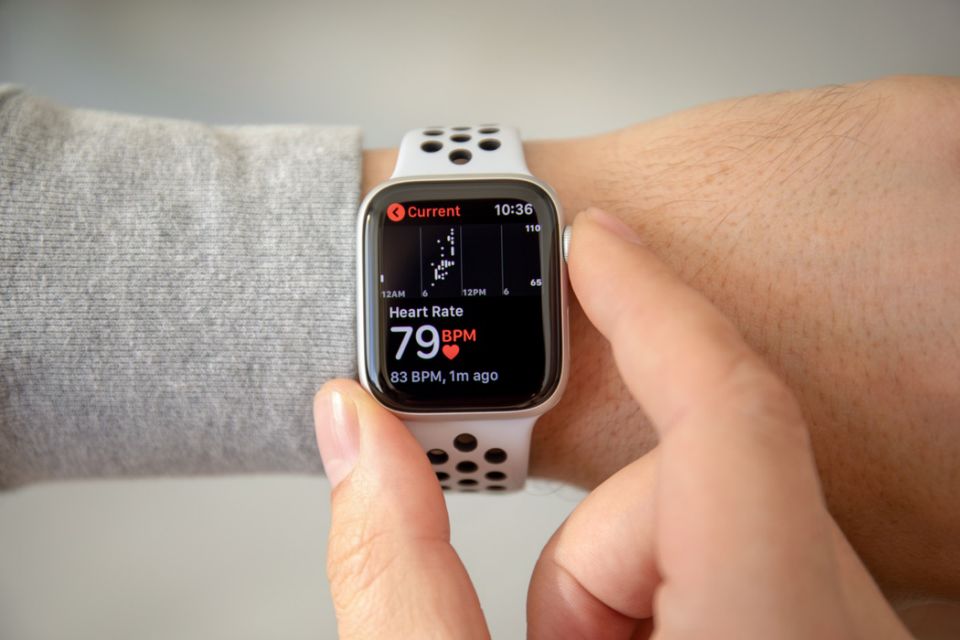
With it’s new electrocardiogram feature, the latest Apple Watch is FDA- approved to detect an irregular heartbeat—but do cardiologists trust it? One doesn’t—at least not entirely. “It seems like a wonderful idea and I’m sure there are some potential upsides to it,” Micah Eimer, M.D., a cardiologist and medical director for the Northwestern Medicine Glenview and Deerfield Outpatient Centers, told SELF. But he is concerned about alarms going off when nothing’s actually wrong. Consider the app a helpful friend. Consider the doctor the expert.
39
Be Pro-Pooch

“People who have dogs live longer than people who have cats, and the assumption has been that dogs naturally cause their owners to be more active,” suggests Dr. Thomas Lee, Co-Editor in Chief of the Harvard Heart Letter. “The emotional benefits of having an affectionate creature are also one of the theories for why dog-lovers live longer.” Odie 1, Garfield 0.
40
Doctors Know You’re Human. So Are They.

It’s impossible to follow everything on this list to the letter—cardiologists know that, and some struggle themselves with smoking, drinking or eating unhealthily. But most of those we interviewed said every little change you make can add up to big results. They know you’re human. They just want you to be human for longer, and to be your healthiest and happiest self.
As for yourself: To get through this pandemic at your healthiest, don’t miss these 35 Places You’re Most Likely to Catch COVID.
